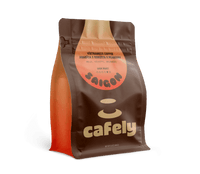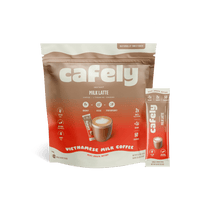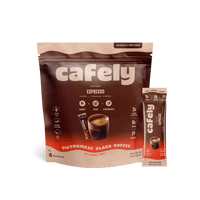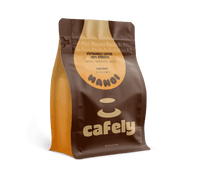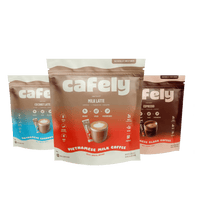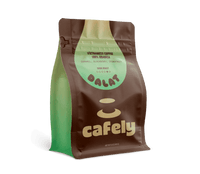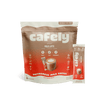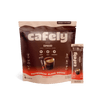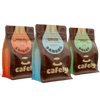Coffee enemas have become the latest celebrity trend, touted as a quick-fix remedy for eliminating toxins and waste from the body and helping with weight loss. Proponents claim it can treat cancer, boost energy levels, and reduce inflammation.
If it sounds too good to be true, it’s because it is.
Coffee enemas have almost no scientific backing and have been linked to problems with electrolyte balance, intestinal damage, inflammation, and infection.
Here’s the truth about coffee enemas.
What is a Coffee Enema?
A coffee enema involves inserting a tube into the rectum and introducing freshly brewed coffee cooled down to body temperature into the colon. It's then left to sit there for several minutes.
Coffee enemas have had a place in certain alternative medicine circles since their inception in the 1930s when Doctor Max Gerson popularised the treatment as part of his Gerson Therapy.
Gerson Therapy uses a strict vegetarian diet and frequent coffee enemas to flush the colon. Gerson believed that his treatment helped many diseases, including cancer.
The theory is that caffeine stimulates the bile duct and boosts glutathione, which binds with toxins in your colon. The caffeine and accompanying waste are flushed from the body, leaving you cleansed and detoxified.
There is absolutely no evidence to support this.
Coffee Enema: The Procedure (Not Recommended)
The process of a coffee enema is straightforward, but simple doesn’t mean safe.
Here are the steps:
- Ground coffee is brewed normally and cooled to body temperature.
- The patient lies on their side.
- Using a specialized enema kit, the coffee is poured into a bucket (or bag), the nozzle is lubricated and inserted into the rectum, and the coffee is allowed to flow into the colon.
- Coffee sits for 10-15 minutes before being flushed out via a tube or toilet.
Claimed Benefits of Coffee Enemas
Coffee enemas have many claimed benefits, but most of them have been heavily disputed by the medical community. Supporters of the therapy point out that it’s the caffeine in the colon flush that makes all the difference.
The theory states that caffeine stimulates the bile duct, thereby increasing enzymatic activity in the intestine. In addition, caffeine boosts the production of glutathione, an enzyme that binds with free radicals and toxins in the body.
Advocates claim coffee enemas can provide the following benefits:
- Reduce inflammation
- Improve bowel function
- Increase oxygen distribution through the body
- Boost energy levels
- Improve liver function
- Relieve constipation
- Reduce symptoms of Irritable Bowel Syndrome
- Stop yeast overgrowth (Candida)
- Help fight viruses
- Promote weight loss
- Treat depression
- Support cancer treatment as part of Gerson Therapy
There is no scientific evidence for any of these claims — all of the “evidence” is anecdotal.
In addition, the medical community considers colon cleansing unnecessary. The theory known as autointoxication states that toxins within the colon can poison the body, but there’s no evidence to support it.
Research shows that the human body is highly efficient at eliminating toxins and does not need us to rinse our colons with coffee to accomplish this [1].
Potential Risks & Warnings
Medical professionals, such as the National Library of Medicine, stress that a coffee enema has many potential risks, and Medical News Today has documented evidence of three deaths following this procedure. Medical opinion is that the risks of coffee enemas outweigh any of the perceived benefits [2].
Coffee enemas are known to cause the following problems:
- Cramps
- Nausea
- Diarrhea
- Rectal Burns
- Rectal Puncture
- Vomiting
- Bloating
- Bowel Perforation
- Dehydration
Long-term risks from frequent use of coffee enemas include:
- Colitis — an inflammation of the lining of the colon
- Proctocolitis — an inflammation of the rectum
- Severe dehydration and electrolyte imbalance
Septicemia — also called sepsis (blood poisoning)
The National Cancer Institute reports three known deaths from coffee enemas: two from electrolyte imbalances and one from septicemia (blood poisoning).
Individuals with the following conditions face severe and life-threatening risks and should avoid coffee enemas:
- Digestive conditions, including Crohn’s disease, Ulcerative Colitis and Diverticulitis
- A history of bowel surgery
- Congestive heart failure
- Intestinal tumors
- Gastrointestinal cancer
- Blood vessel disease
- Kidney, heart, and liver disease
- Severe hemorrhoids
- Abdominal hernias
- Anemia
- Allergy to coffee
Women who are pregnant or nursing should not undertake a coffee enema.
Coffee enemas should never be done at home. Always use a professional who knows how to do a coffee enema.
Related: Caffeine Uses, Risks, & Long-Term Effects

Scientific Perspective & Research
Current research shows no evidence that coffee enemas work. Instead, it recommends they be avoided as a high-risk practice.
The only documented research on Gerson therapy and the positive impact of coffee enemas was undertaken by the Gerson Foundation in 2014. This research showed a slightly higher survival rate among cancer patients. However, on examination, the methodology used was unreliable and flawed.
The National Cancer Institute reviewed coffee enemas in 2010 and found no evidence that they helped people with cancer.
Dr. Nicholas Gonzalez created a cancer treatment that was similar to Gerson’s and prescribed frequent coffee enemas. His study of 55 people found that those taking chemotherapy (gemcitabine) had a better quality of life and survived 3x longer than those following the Gonzalez Regimen, and there was no evidence that coffee enemas of Gerson’s Therapy extended life with cancer [3].
The FDA (Food and Drug Administration) ruled that those participating in coffee enema studies be warned of the risk of death. They have approved colon cleansing only to prepare for medical procedures.
Alternatives to Coffee Enemas
There are many safer and more effective methods to achieve the benefits of coffee enemas. Healthline advises on the following natural and evidence-based strategies to improve your health. There’s very little research backing detoxes of any kind, so your best bet is to make healthy lifestyle changes [4].
1. Drink Water
If your body gets enough water, it can flush out waste and detoxify without any help. Drink at least eight glasses of water daily to keep your body running smoothly.
2. Eat A Balanced Diet
Eat high-fiber and antioxidant-rich foods to flush your body. Fiber helps your digestive system work to eliminate toxins, while foods such as berries, nuts, and seeds support your liver function. Focus on eating whole foods: fruits, vegetables, whole grains, lean proteins, and healthy fats.
3. Exercise Regularly
Pumping your circulation and sweating are excellent for boosting your metabolic function and flushing out toxins. Aim for 30 minutes of exercise every day. Yoga is proven to reduce stress, which can contribute to a buildup of toxins.

4. Avoid Toxins
We all know alcohol, smoking, and processed sugary foods are bad for us. Avoid putting toxins in your body, to begin with by steering clear of poisonous vices.
5. Take Natural Health Supplements
Natural supplements and vitamins can help support our natural detoxification processes.
Supplements that can help include things like vitamins A, C, E, K, B1, B6, and beta-carotene. Herbs like dandelion, schizandra, milk thistle, garlic, and rosemary all support the health of the liver, which is responsible for most of our natural detoxification processes.
6. Manage Constipation
If you’re suffering from constipation, there are natural remedies that can gently soothe and relieve. Consider eating prunes, natural prebiotic foods, and coffee, all of which are proven laxatives. Ensure you drink enough water and consider cutting back on dairy.
7. Receive Regular Doctor Check-Ups
It goes without saying that if you have serious concerns about detoxification and your general health, you should visit your healthcare provider. Check-ups are essential to general healthcare, and regular visits allow you to monitor your ongoing health.

FAQs: Coffee Enemas
1. What is a coffee enema?
A coffee enema is the process of inserting a tube and nozzle into the rectum to pass lukewarm coffee into the colon. The coffee is allowed to sit for 10-15 minutes before being passed back out.
2. What do coffee enemas do?
Coffee enemas make many unsubstantiated claims. Supporters of the procedure claim that coffee enemas stimulate liver function and bind to toxins, which are then flushed out. The hypothetical benefits include reduction of inflammation, improved liver function, increased energy, relief of constipation, IBS, and candida.
3. Is there any scientific evidence supporting coffee enemas?
There is no credible evidence to support the health claims made about coffee enemas. All medical claims are unreliable or anecdotal.
4. What are the risks of performing a coffee enema?
There are a huge number of risks associated with coffee enemas. The procedure can cause nausea and vomiting, diarrhea, damage to the rectum, and bowel perforation. Documented post-procedural risks include colitis and proctocolitis, electrolyte imbalances, infections, and, in severe cases, death.
5. Can coffee enemas treat chronic diseases?
There is no quality scientific evidence that suggests coffee enemas can treat chronic diseases. Research is derived from case reports which indicate that the risks associated with coffee enemas outweigh any perceived health benefits. All documented evidence was unreliable and mostly anecdotal.
6. How often do proponents recommend using coffee enemas?
The suggested frequency of coffee enemas varies. Some proponents suggest a twice-daily regime for six months to resolve serious medical conditions, whilst a weekly coffee enema is recommended for ongoing health benefits.
7. What should I do if I experience adverse effects from a coffee enema?
Some symptoms are expected after a coffee enema, including bloating, cramping, nausea, and diarrhea. Seek immediate medical attention if you experience severe symptoms, rectal bleeding or pain, do not have a bowel movement within 30 minutes of the coffee enema, or have symptoms of dehydration.
8. Are there safer alternatives to coffee enemas for detoxification?
Yes. There are many far safer alternatives to coffee enemas.
- Drink eight glasses of water a day
- Eat high-fiber and antioxidant-rich foods
- Exercising for 30 minutes daily
- Avoid alcohol, tobacco, and sugary foods
Alternative remedies for detoxification include acupuncture, reiki, saunas, fasting, and consuming naturally occurring vitamins and herbs. Regular medical checkups will ensure your body is healthy.
9. Why do some people still use coffee enemas despite the risks?
People still use coffee enemas for a variety of reasons.
- Lack of awareness of the risks of coffee enemas.
- Belief in anecdotal reports of benefits despite the lack of scientific backing.
- Distrust in modern medicine and a preference for alternative or natural therapies.
10. Should I consult a doctor before trying a coffee enema?
Yes, always consult a healthcare provider before trying a coffee enema. Your healthcare provider will assess your general health and advise if you are at particular risk from a coffee enema. They can advise you on the dangers associated with the procedure and be available for emergency treatment should complications occur.
References
- Mathias, M. (2018). Autointoxication and historical precursors of the microbiome–gut-brain axis. Microbial ecology in health and disease, 29(2), 1548249.
- Son, H., Song, H. J., Seo, H. J., Lee, H., Choi, S. M., & Lee, S. (2020). The safety and effectiveness of self-administered coffee enema: A systematic review of case reports. Medicine, 99(36), e21998.
- Josefson, D. (2000). US cancer institute funds trial of complementary therapy.
- Dennett, C. (2024). Should I Do a New Year's Detox or Cleanse? Detox diets may not be the best solution for a healthy mind and body. Environmental Nutrition, 47(2), 7-8.
